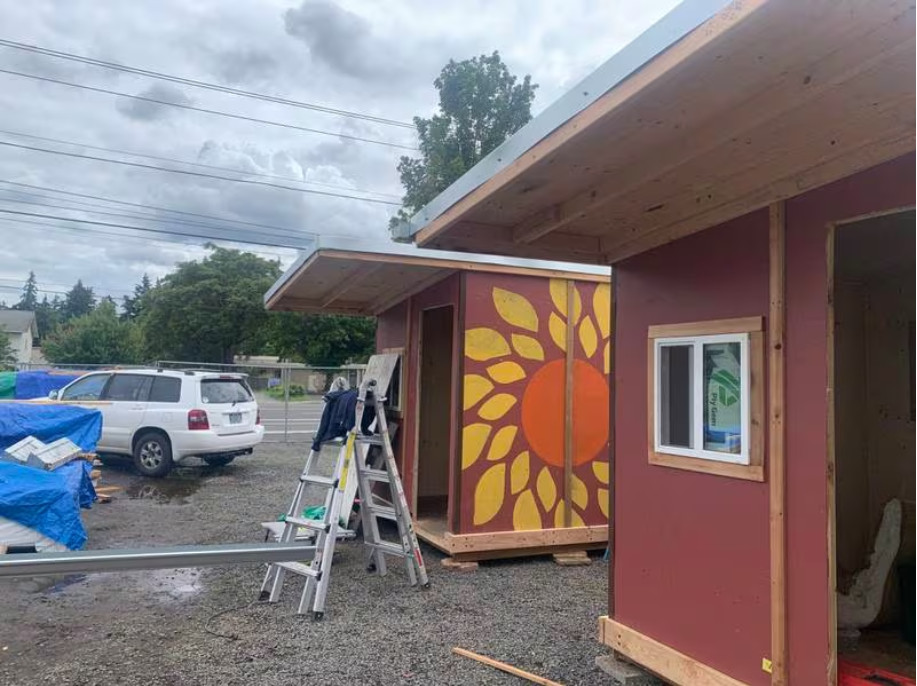Nearly 1,000 neighbors sent a letter to Commissioner Dan Ryan, asking that he have “direct involvement” in negotiating with the nonprofit that’s building the village.
A tiny home village slated to open soon in East Portland is receiving what is now familiar opposition from neighbors of soon-to-be homeless establishments who plead: Put it somewhere, just not here.
 Nearly 1,000 residents in the neighborhoods surrounding the pod village sent a letter to Commissioner Dan Ryan bemoaning the prospect, saying the village will attract crime, sex work, vagrancy and drug dealing and result in a drop in their property values.
Nearly 1,000 residents in the neighborhoods surrounding the pod village sent a letter to Commissioner Dan Ryan bemoaning the prospect, saying the village will attract crime, sex work, vagrancy and drug dealing and result in a drop in their property values.
The village is being built and run by WeShine, a young nonprofit led by a small group of Portlanders who aim to build 10 tiny villages in neighborhoods across the city outfitted with basic cooking and sanitary amenities, case management and behavioral health resources. This particular village, located on Northeast Halsey Street in the Parkrose neighborhood, will prioritize LGBTQ+ and BIPOC Portlanders.
The nonprofit held a heated meeting about the village at the church in May. Some neighbors yelled and cursed, according to attendees who spoke to WW.
Arlene Kimura, president of the Hazelwood Neighborhood Association, attended the church meeting.
“I didn’t want to be part of a yelling match,” Kimura says. “There was a very vocal minority who made it a very contentious meeting.”
The letter sent by neighbors recounted the meeting, too: “When confronted with community concerns, WeShine board member Ms. Janet McManus shamed the opposition, saying, ‘What have you done for the homeless?’”
The neighbors wrote to Ryan that they had requested assurances from WeShine that the neighborhood wouldn’t be affected by “sex work in public,” predatory drug dealing, vandalism and “vagrancy,” among other concerns. The neighbors requested “direct involvement” from Ryan himself.
They described a particular camper that the church allowed to stay on its property: “After a year of living with the untreated and menacing tent camper, the church finally gave the camper a 90-day eviction notice….This experience has made us conscious of how important detailed planning is to the success of homelessness solutions.”
Ryan’s office has previously said it supports the nonprofit’s village, and spokeswoman Margaux Weeke says their office has “not sent an official response to the letter.”
The opposition to WeShine is similar to that experienced by the city’s other planned tiny house villages. While several neighborhoods tried to lobby the city to do criminal background checks on residents and require them to be sober, the city wouldn’t budge, insisting the villages maintain a low barrier to admission to serve Portlanders most in need. (Only two of the villages are currently operational.)
Executive director McManus sent a letter to the Joint Office of Homeless Services on June 20, upset it hadn’t yet finalized its contract with WeShine.
She wrote that the lack of funding would halt the nonprofit’s ability to open the village and pay employees and that she and other leaders had to spend $8,000 out of their own pockets to continue construction.
“We are stunned by the JOHS’s failure to date to honor the verbal commitments made by staff [in March] to reimburse a large part of WeShine’s development costs for the Parkrose Community Village prior to completing a formal contractual agreement,” McManus wrote.
Former Joint Office executive director Marc Jolin replied on June 21: “While I was hopeful that we could move forward more quickly on the contracting and cover expenses incurred this fiscal year, I would not have told you that we could release funding to you before a contract was in place.”
(WeShine is slated to get two rounds of funding from the Joint Office, one for this past fiscal year and another in the coming year.)
The Joint Office confirmed WeShine has since received the promised dollars for construction. The two parties are still finalizing the next fiscal year’s contract.
The new opening date has been pushed back to early August. While WeShine awaits a commercial permit from the city to build kitchen and bathroom facilities, McManus says it will make do with portable toilets and mobile showers.
